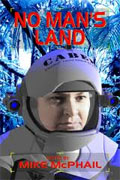No Man's Land
ed. Mike McPhail
book reviews:
· general fiction
· chick lit/romance
· sci-fi/fantasy
· graphic novels
· nonfiction
· audio books
· author interviews
· children's books @
curledupkids.com
· DVD reviews @
curledupdvd.com
newsletter
win books
buy online
links
home
for authors
& publishers
for reviewers

 |
No Man's Land (Defending the Future, Book 4) Mike McPhail, editor Dark Quest Paperback 248 pages May 2011 |
|
All the best qualities MilSF fans love about the genre come together in this anthology edited by Mike McPhail: No Man's Land (Defending the Future, Book 4)
“Cracking the Sky” by the talented Brenda Cooper (she co-authored Building Harlequin’s Moon with Larry Niven) opens up the anthology. This story expands the nature of warfare of the future to include—what else?—nature itself, in the form of storms that can be called up to devastate one’s enemy with lightning strikes. The story includes robot dogs that are used both as pack animals and as efficient combat forces. Also, the importance of bees to the future reminds readers how vital bees are to us today, as well, and of their diminishing numbers. Nancy Jane Moore’s “Gambit” is a cool piece about a civil war on Titan. Main character Cassie, “part of a peacekeeping force,” is pulled into the heat of battle and her fellow soldiers are killed. When confronted with a choice to aid refugees who help her survive on the brutally cold satellite, will she also help them to reach safety, despite knowing that she could be court-martialed? When should a soldier stop obeying orders, rules, and regulations, and instead do what she or he feels is right, according to what is morally right? Maria V. Snyder’s brilliant “Godzilla Warfare” describes the attempts of the main character, Sergeant Val Harris, to prevent a Godzilla bomb from destroying an entire planet. Here the monster is a modern extreme weapon of the future, instead of a dinosaur-like monster reanimated by radiation. Val is sent there to a colony that owes billions of dollars to Earth in the hopes that she will actually fail—then Mother Earth can say about the whole affair to her other colonies, “Oops! Well, at least we tried!” The colony has no intention of repaying their debt to Mother Earth, so they are meant to become the object of the ultimate revenge: total annihilation. Will Val succeed? The ghosts of the title of Danielle Ackley-McPhail’s “Ghosts On the Battlefield,” set on the planet Demeter, refer not to the spooky specters that haunt houses but to ghostly images of enemy aircraft that appear on radar and attack the two main characters of the story: the unit leader of the Morrigans, Captain Jayne “Scarlet Jay” Corvidae, and her charge, rookie fighter pilot Panski, who comes “from presidential stock.” When they come under attack after drifting into enemy territory, will even the Scarlet Jay’s formidable skills be able to save them, or will Panski meet the same fate—death—as the son of a general whom Corvidae crashed into early in her famed career? “Trashing” by Phoebe Wray closes the anthology. Unique as far as MilSF stories go, it focuses on space junk and debris and the dangers faced by those soldiers whose jobs it is to make space a cleaner place. Lieutenant Junior Grade Renn Haggarty faces death every time she is called upon to make space walks to investigate and recover space debris. It can prove to be very valuable as scrap, though, or even far more valuable, like the millions of seeds she and the crew of the Plowshare recover in the story. When her ship comes under attack by battle cruisers and they also have to contend with an asteroid belt, Renn has to decide whether saving the seeds is more important than saving her own life. Those stories are representative of the quality of all fourteen collected here. No Man's Land Originally published on Curled Up With A Good Book at www.curledup.com. © Douglas R. Cobb, 2011 |
|
|
|
 Click here to learn more about this month's sponsor! |
|
| fiction · sf/f · comic books · nonfiction · audio newsletter · free book contest · buy books online review index · links · · authors & publishers reviewers |
|
| site by ELBO Computing Resources, Inc. | |
 Not to worry if you happen to be a guy and wonder if you can find enough action, thrills, and adrenalin-induced stories to attract your attention. Each of the tales in the collection is a gem of storytelling that will appeal to anyone who loves reading MilSF, regardless of gender. The stories may be written by women, but guys will dig them, too. If you doubt that, consider that David Weber, one of the top authors of the MilSF genre, wrote the introduction to the anthology, praising the tales in glowing terms. This MilSF anthology comprising 14 stories is engrossing and action-packed, and it deserves to reach a wider audience.
Not to worry if you happen to be a guy and wonder if you can find enough action, thrills, and adrenalin-induced stories to attract your attention. Each of the tales in the collection is a gem of storytelling that will appeal to anyone who loves reading MilSF, regardless of gender. The stories may be written by women, but guys will dig them, too. If you doubt that, consider that David Weber, one of the top authors of the MilSF genre, wrote the introduction to the anthology, praising the tales in glowing terms. This MilSF anthology comprising 14 stories is engrossing and action-packed, and it deserves to reach a wider audience.